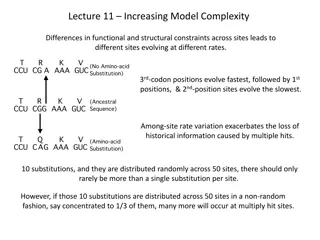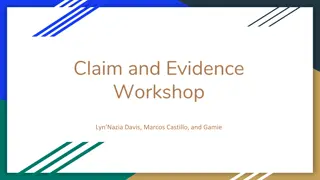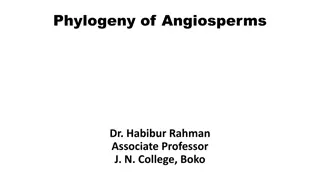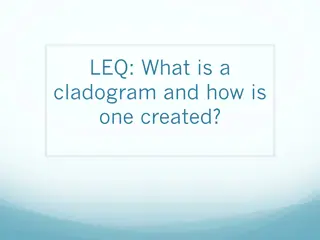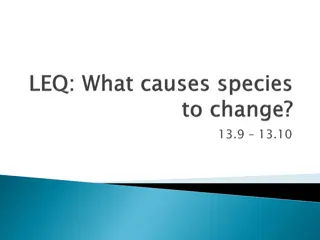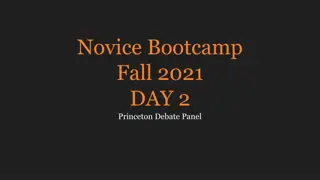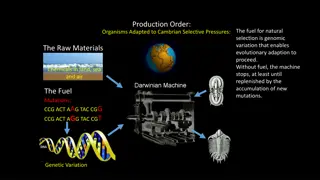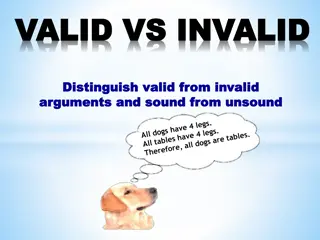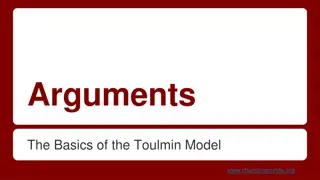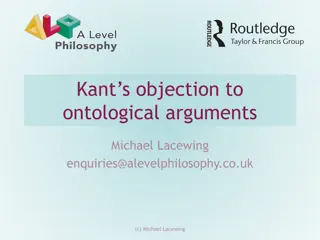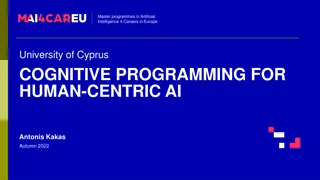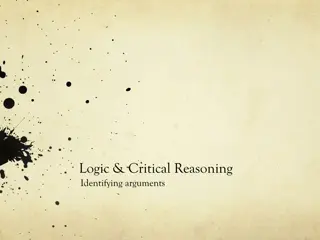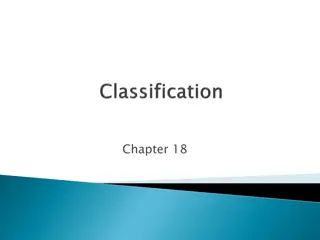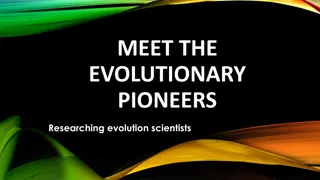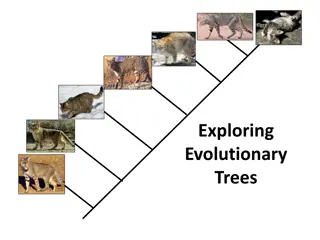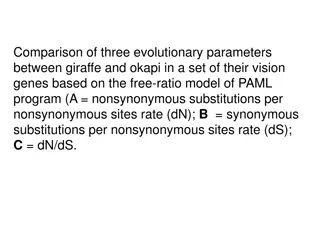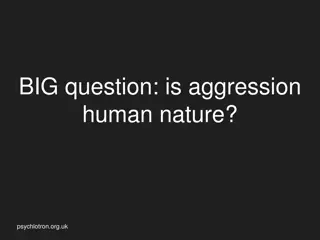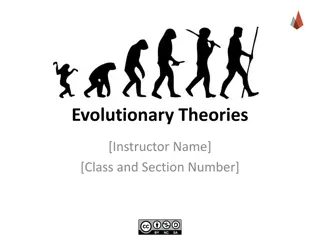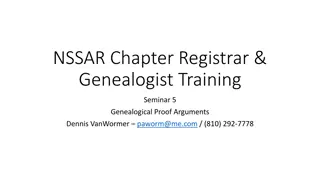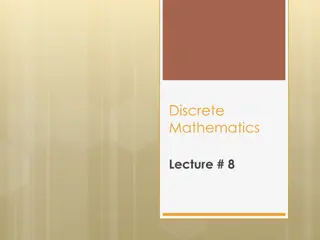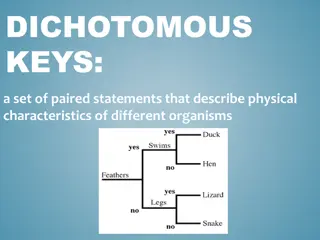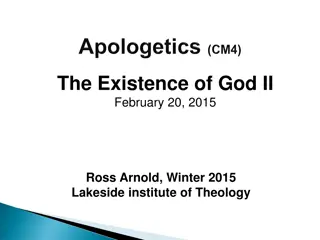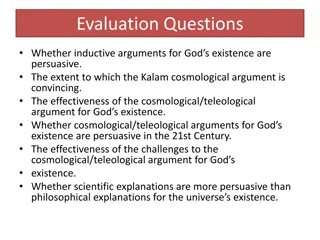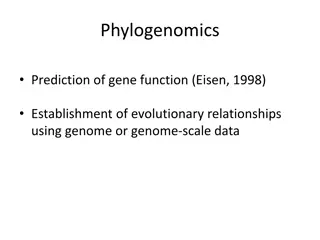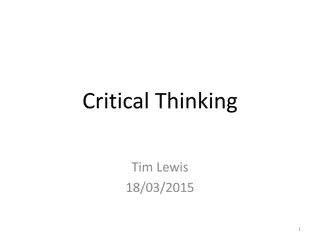Evolution and Plant Systematics Lecture Overview
This lecture outline delves into the concepts of evolution, unity, and diversity of organisms on Earth, covering topics such as fossils, Lamarck and Darwin's theories, adaptation, natural selection, artificial selection, Carolus Linnaeus' systematics, plant evolution, and the demonstration of evolut
5 views • 26 slides
Evolutionary Models in Molecular Biology
Differences in functional and structural constraints across sites lead to varying rates of evolution in molecular sequences. Understanding the complexities of site-specific rates, among-site rate variation, site-specific rates models, invariable sites model, and continuous methods is crucial for acc
6 views • 15 slides
Phylogenetic Status of Peripatus: Exploring its Systematic Position
Peripatus, known as claw bearers, exhibits characteristics of both annelids and arthropods, making it an intriguing species in the study of evolutionary biology. Considered as an intermediate link between these two phyla, Peripatus raises questions about its classification and evolutionary history.
0 views • 10 slides
Mastering the Toulmin Method for Constructing Persuasive Arguments
Learn how to effectively structure arguments using the Toulmin Method, which consists of Claim, Data, Warrant, Backing, Counterclaim, and Rebuttal elements. Explore reasoning and logic concepts, differentiate between inductive and deductive reasoning, and understand how to construct valid arguments
0 views • 30 slides
Understanding Phylogeny and Evolution in Angiosperms
Phylogeny is the study of evolutionary relationships among organisms, depicted in phylogenetic trees based on shared characteristics. This overview delves into terms like homology, analogy, monophyly, and co-evolution in angiosperms with an emphasis on taxonomy, systematics, and the evolutionary his
1 views • 25 slides
Understanding Cladograms and Phylogenetic Analysis
Cladograms are used in cladistics to illustrate evolutionary relationships between organisms based on shared ancestral and derived characters. They are created by grouping species by common descent, forming clades that include an ancestral species and all its descendants. Valid clades are monophylet
0 views • 11 slides
Understanding Evolutionary Mechanisms: Natural Selection, Genetic Drift, and Gene Flow
Exploring the forces behind evolutionary change, this content delves into natural selection, genetic drift, and gene flow. Examples such as the bottleneck effect, founder effect, and Amish population polydactylism are presented to illustrate how these mechanisms shape genetic diversity. The impact o
0 views • 14 slides
Understanding the Structure of Balanced Arguments
Explore the concept of using the third person in writing balanced arguments to maintain objectivity and structure. Learn about third person pronouns and the importance of being unbiased in your writing. Understand the significance of structuring your arguments and maintaining a clear order for effec
0 views • 11 slides
Mastering Alan Peat's Balanced Arguments with Different Sentence Types
Explore the use of various Alan Peat sentence types in crafting balanced arguments, focusing on incorporating semi-colons effectively. Engage in interactive activities and practice sessions to enhance your skills in creating compelling arguments. Dive into examples and exercises to refine your under
1 views • 12 slides
Mastering Debate: Essential Strategies and Techniques
Learn key concepts like argument structure, points of clarification, and how to make compelling arguments in a debate setting. Discover the importance of warrants, impacts, and implications in formulating strong arguments. Explore tips on coming up with effective arguments and understanding differen
0 views • 47 slides
Mastering Final Focus in Debates
Final Focus, a crucial 2-minute speech at the end of a debate, serves as your last chance to persuade the judge of your victory. It involves comparing key voters and emphasizing the impact of your arguments. Weighing key voters is essential, with a focus on demonstrating why the scale tips in your f
1 views • 4 slides
Insights into Evolutionary Adaptation and Genetic Variation
The production order highlights the essential role of genomic variation as fuel for natural selection, driving evolutionary adaptation. The Cambrian Explosion timeframe reveals a rapid increase in evolutionary adaptation, showcasing the appearance of diverse animal phyla over a relatively short peri
5 views • 6 slides
Understanding Reasonable Arguments vs. Pseudo-Arguments
The provided content focuses on distinguishing between reasonable arguments and pseudo-arguments through thought-provoking questions such as the ethical treatment of animals, city subsidies for sports venues, and subjective opinions on aesthetics. It also explains the structure of an argument, highl
0 views • 18 slides
Understanding Valid and Invalid Arguments in Logic
In logic, arguments consist of premises supporting a conclusion, with deductive arguments claiming logical necessity. Valid arguments have premises implying the conclusion, making them deductively valid. For example, if all actors are robots and Tom Cruise is an actor, then logically Tom Cruise must
0 views • 25 slides
Computing Triplet and Quartet Distances Between Evolutionary Trees
Study on computing triplet and quartet distances in evolutionary trees, comparing rooted vs. unrooted, binary vs. arbitrary degree trees. Discusses algorithms, experimental results, and evolutionary tree construction methods. Includes analysis on cultural phylogenetics and evolutionary tree comparis
0 views • 27 slides
An Examination of Ontological Arguments for God's Necessary Existence
Various ontological arguments, such as Malcolm's and Anselm's, propose that the existence of God is logically necessary, grounded in the concept of God as the greatest possible being. These arguments challenge the coherence of the concept of God and counter objections, like Kant's claim that existen
2 views • 10 slides
Understanding the Toulmin Model for Effective Argumentation
The Toulmin Model provides a structured approach to crafting and evaluating arguments, consisting of key components like claims, grounds/data, and warrants. It emphasizes the importance of using evidence and reasoning to support claims effectively. By understanding this model, one can enhance the pe
0 views • 13 slides
Kant's Critique of Ontological Arguments
An exploration of Kant's objection to ontological arguments, examining the flaws in the reasoning of Anselm and Descartes. Kant argues that existence is not a predicate and does not enhance the concept of a being. Therefore, ontological arguments cannot prove the existence of God solely through conc
0 views • 7 slides
Understanding Argumentation and Realization in AI Master Programmes
Exploring the concept of argumentation and its realization in artificial intelligence master programmes, focusing on the construction, evaluation, and implementation of arguments through cognitive programming. The framework involves structured argumentation, conflict relations, and strength/preferen
1 views • 31 slides
Understanding Logic and Critical Reasoning: Identifying Arguments
In the study of logic and critical reasoning, identifying arguments is a fundamental task. Arguments consist of premises supporting a conclusion, and they can be identified by specific indicators and techniques. Understanding argument structure and types of support, such as deductive and inductive,
2 views • 15 slides
Understanding Taxonomy and Classification in Biology
Scientists use classification to group organisms logically, making it easier to study life's diversity. Taxonomy assigns universally accepted names to organisms using binomial nomenclature. Carolus Linnaeus developed this system, organizing organisms into species, genus, family, order, class, phylum
0 views • 11 slides
Guide to Oral Arguments in Trial Court
Learn how to conduct oral arguments in a trial court, including the steps for both the movant and respondent, strategies for making strong arguments, and tips for responding effectively. This comprehensive guide covers the dos and don'ts of oral arguments, emphasizing the importance of preparation,
0 views • 9 slides
Supporters of Slavery in the 19th Century: Legal, Religious, and Economic Arguments
In the 19th century, defenders of slavery utilized legal arguments by denying citizenship rights to blacks, religious arguments by justifying ownership and guidance through biblical references, and economic arguments by comparing treatment of slaves in the South to conditions of workers in the North
0 views • 4 slides
Understanding Command-line Arguments and Errors
Learn how to utilize command-line arguments in Python scripts to enhance flexibility and parametrize functions for various inputs. Explore ways to access and utilize command-line arguments effectively, while handling errors gracefully.
0 views • 30 slides
Evolutionary Pioneers: Anning, Darwin, Wallace - Key Figures in Evolutionary Theory
Meet the evolutionary pioneers - Mary Anning, Charles Darwin, and Alfred Russel Wallace, who played crucial roles in the development of evolutionary theory. Learn about their groundbreaking discoveries, challenges faced, and lasting impact on the scientific community.
0 views • 7 slides
Exploring Evolutionary Trees and Family Lineages
Dive into the world of evolutionary trees and family lineages through captivating visuals and informative illustrations. Explore the relationships between species, understand genetic connections, and discover how traits evolve and spread through generations. From evolutionary history to family trees
0 views • 25 slides
Analyzing Arguments in English Debates: A Critical Approach
Explore and critique various arguments presented in English debates, including topics like dietary recommendations, digestion issues with Japanese rice, and driving skills in different weather conditions. Learn how to evaluate evidence, causality, and persuasiveness in arguments to develop critical
0 views • 19 slides
Mastering Academic Writing Moves: The Art of Summarizing
In academic writing, mastering the art of summarizing is crucial for persuasive arguments. By engaging in dialogue with others and summarizing their arguments, writers can strengthen their position. It is important to strike a balance between the original author's ideas and your own, emphasizing asp
0 views • 15 slides
Comparative Analysis of Evolutionary Parameters in Giraffe and Okapi Vision Genes
This presentation compares three evolutionary parameters (dN, dS, dN/dS) between giraffe and okapi in a set of vision genes using the free-ratio model of the PAML program. The images illustrate the differences in nonsynonymous and synonymous substitutions, as well as the ratio of nonsynonymous to sy
0 views • 4 slides
Understanding Aggression: Exploring Its Evolutionary Roots
Delve into the complexities of human aggression, questioning whether it is inherent or a learned behavior. Explore evolutionary theories and biological perspectives on the causes of aggression, examining how factors such as genetics, brain structures, hormones, and environmental pressures may influe
0 views • 11 slides
Understanding Evolutionary Theories and Strategies
Exploring evolutionary theories such as Sexual Selection Theory and Gene Selection Theory sheds light on how characteristics evolve for mating advantage. Insights into intersexual and intrasexual competition offer a deeper understanding of mate selection preferences. Gene selection mechanisms influe
0 views • 20 slides
Exploring Human Origins Through Hominid Fossils and Evolutionary Traits
Delve into the fascinating world of human origins, examining hominid fossils, anatomical traits, and evolutionary evidence. Learn about early species like Ardipithecus ramidus, differentiate African apes from modern humans, and analyze the genetic lineage supporting human evolution. Explore tables,
0 views • 14 slides
An Overview of Debate: Propositions, Teams, and Formats
Debate is a regulated discussion between two matched sides discussing a proposition, with the affirmative arguing for change and the negative defending the status quo. The standard debate format involves constructive arguments followed by rebuttals from both sides. The roles in a debate include the
0 views • 47 slides
Genealogical Proof Arguments and SAR Standard of Proof
This detailed content covers the definitions and components of genealogical proof arguments, proof summaries, and the SAR standard of proof. It explains the importance of evidence quality, source citations, and analysis in establishing acceptable genealogical conclusions for SAR membership applicati
0 views • 22 slides
Understanding Valid and Invalid Arguments in Discrete Mathematics
Concepts of valid and invalid arguments in discrete mathematics are explored through examples. Learn how to determine the validity of arguments based on premises and conclusions. Practice using truth tables to evaluate argument forms. Enhance your logical reasoning skills in Discrete Mathematics.
0 views • 22 slides
Understanding Dichotomous Keys and Cladograms in Evolutionary Biology
Dichotomous keys are utilized to classify different organisms based on their physical characteristics, while cladograms depict evolutionary relationships. Derived traits play a crucial role in understanding evolutionary history, indicating features present in later organisms but not earlier ones. Pr
0 views • 16 slides
Philosophical Apologetics: Arguments for the Existence of God
Philosophical apologetics presents various arguments for the existence of God, including the ontological, cosmological, teleological, moral, transcendental, and presuppositional arguments. These arguments cover diverse aspects such as change, causality, design, contingency, miracles, consciousness,
0 views • 10 slides
Evaluating Arguments for God's Existence in the 21st Century
Exploring the persuasiveness of inductive arguments for God's existence, assessing the Kalam cosmological argument, and evaluating the effectiveness of cosmological/teleological arguments. Delving into whether scientific explanations surpass philosophical ones, the strengths and weaknesses of these
0 views • 16 slides
Understanding Phylogenomics and Gene Function Prediction in Evolutionary Biology
Explore the significance of phylogenomics in predicting gene functions and establishing evolutionary relationships using genome-scale data. Learn about the challenges of using single genes or a few genes in phylogenetic analysis, the importance of analyzing multilocus data, and the need for multiple
0 views • 24 slides
Understanding Critical Thinking, Hypotheses, and Arguments
Explore the concepts of critical thinking, hypotheses, and arguments in this informative content. Learn about the definition of hypotheses, the nature of arguments, and syllogisms. Delve into the world of logical reasoning and the foundations of thought processes.
0 views • 32 slides

